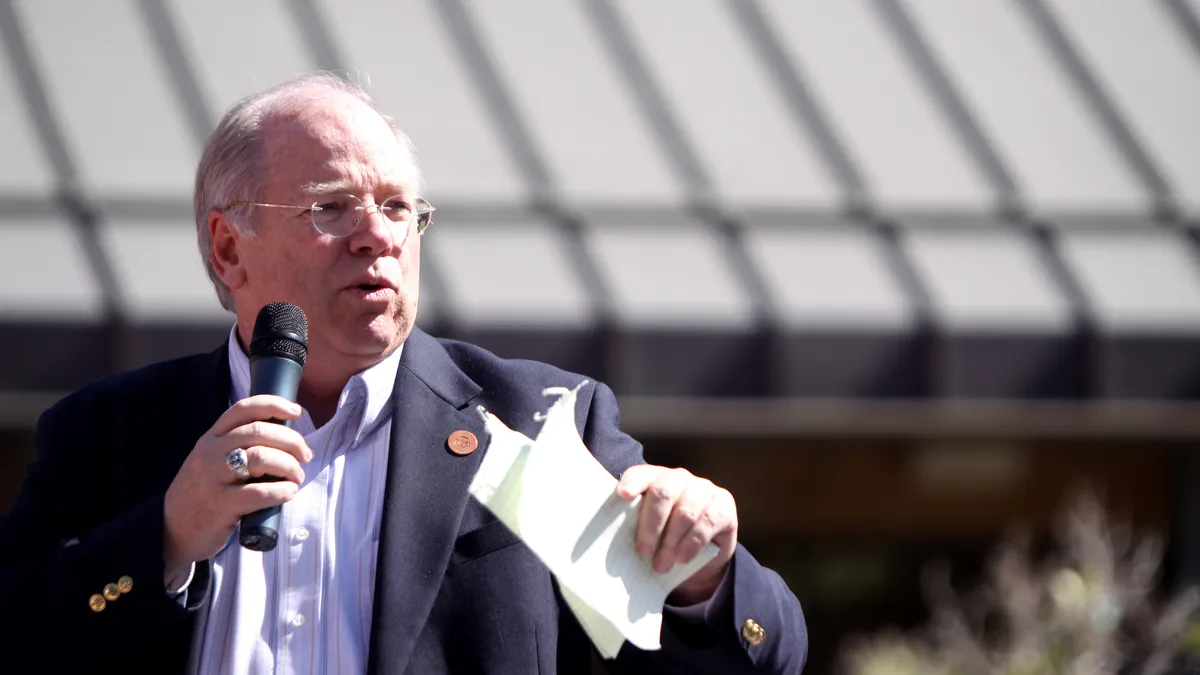Dive Brief:
-
The Arizona Corporation Commission (ACC) on Wednesday extended a partial moratorium on utility construction of new large gas-fired generators in the state until Aug. 1, 2019, as they consider a broad, 80% clean energy proposal from Republican Commissioner Andy Tobin.
-
The ban on utility construction of gas plants more than 150 MW, first enacted in March 2018, does not apply to power purchase agreements utilities sign with independent generators. The latest measure passed unanimously, though Republican Commissioner Boyd Dunn warned he would not support any future extension.
-
Shortly before ACC's meeting, Republican Chairman Bob Burns removed an agenda item that would clarify the state's rules under the federal Public Utilities Regulatory Policy Act (PURPA). Tobin had requested the discussion, writing last month that Arizona could miss out in $500 million in solar energy developments without policy changes.
Dive Insight:
Extension of the gas moratorium means Arizona utility regulators will have more time to consider Tobin's Energy Modernization plan, which would mandate 80% zero-carbon resources by 2050 and put in place a 3 GW storage target for 2030.
Tobin last year called the moratorium "imperative" because it "bought the Commission time to develop a comprehensive clean energy plan," which he aimed to have approved by the end of last year.
By December, however, the commission had still not initiated a formal rulemaking proceeding on the docket, with staff instead recommending a series of workshops to conclude in July 2019.
In response, Tobin wrote to his fellow regulators, arguing the "existing moratorium should be extended until at least the conclusion of these workshops, i,e. on or about August 1, 2019."
"[M]y concern is that, if the moratorium expires as planned, utilities may once again consider large capital investments in generating facilities and undermine the effectiveness of any energy plan we adopt in the future," he wrote at the time.
On Wednesday, Tobin's ACC colleagues all agreed to extend the moratorium, but Dunn warned that he would not support a similar move in the future.
"I hope that will be the last time we will deal with a moratorium," he said at the meeting. "I only take this vote on the basis the utilities involved will be allowed to continue to enter into any power purchase agreements they feel are necessary during the period of the moratorium without restriction."
In contrast to the moratorium, the ACC declined to act on Tobin's request for a proceeding to clarify the state's PURPA policies.
In December, the ACC called for hearings to investigate how the state should set contract terms under PURPA, which mandates that electric utilities buy power from qualifying renewable energy facilities. The next month, an administrative law judge set Nov. 13, 2019, as the first day for those hearings.
The timing drew opposition from Tobin, who is concerned that the nearly yearlong wait to begin discussing PURPA policies will cause developers to drop their projects, leaving Arizona without $500 million in planned solar investments.
"There are a number of developers who have been attempting to negotiate in good faith for PURPA projects in Arizona, but who have reached an impasse over what constitutes an acceptable term length for securing project financing," he wrote in a Jan. 29 letter. "While our hearings scheduled for November 2019 are intended to address this issue prospectively, the ALJ and parties agree that they do not provide any guidance today for discussions that are already underway."
In response, Tobin proposed to open a generic policymaking docket to define PURPA contract length and other terms for deals already being negotiated. That docket could provide short term answers for developers "while the Commission awaits the outcome of its prospective proceedings" on PURPA, he said.
The ACC, however, did not consider the PURPA amendments. At the beginning of the meeting, Burns announced it was struck from the agenda without explanation. The next ACC open meeting is March 12-13.













